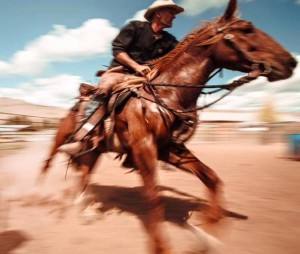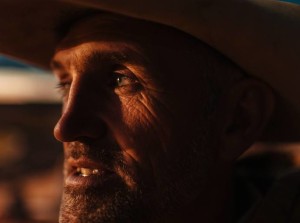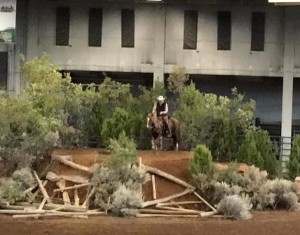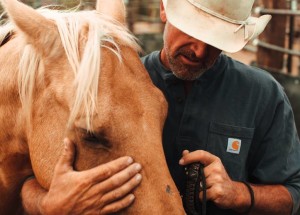West Taylor, 46, runs Wild West Mustang Ranch in Fremont, Utah. For the past several years, he has wholly dedicated himself to gentling and training wild horses adopted from the Bureau of Land Management. It’s been a deeply personal journey for the 46 year-old, who is relatively new to the clinician scene. The certified TIP trainer and award-winning wild horse trainer first did some real work on himself, through time, reflection, and education, he said. Then, he turned to learn more from the horses. Visit his facebook page.
We interviewed Taylor in Mancos, Colorado, just before a screening of Unbranded, the award-winning documentary in which he and his son, Swade, appeared briefly.
In upcoming installments of Mustang Miles & Minutes, we will cover Taylor’s work as he helps Raechel Nelson and her young BLM mare, Alita.
Part I in a series
BestHorsePractices: You like to work with both horses and people, don’t you, as opposed to just starting horses?
West Taylor: Yes, putting the two together. That’s where I get the biggest reward. Then, they can go do something together. Just the horse-knowing doesn’t work nearly as well .
BHP: Is half of your job, then, convincing the person that having you just work with his or her horse doesn’t work?
WT: Yeah. There’s definitely a place for the trainer to handle those dangerous or dynamic moments, for sure. But the owner’s got to have his accountability in that situation going forward. There’s tasks and tools that that owner has to have in order to be competent.
BHP: You mean the skills and the confidence you have are directly proportional to your horse’s skills and confidence?
WT: Absolutely. When I see people and their horses and I can see the horse asking the question: Are you in charge? Are you the leader? When the human doesn’t answer the question, every single time, I see the human’s leadership going down and the horse taking over. Not that the horse wants to, but out of instinct and self-preservation, that’s what they’ll do.
That’s the fun for me – showing people the communication they aren’t seeing, just from little things – a horse stepping this way  or that way. Anything that it’s doing that they aren’t addressing or answering, the horse is thinking: Oh, that person doesn’t talk.
or that way. Anything that it’s doing that they aren’t addressing or answering, the horse is thinking: Oh, that person doesn’t talk.
BHP: Is the lack of response on the human’s part due to ignorance or lack of confidence?
WT: I’m going to say that they don’t know, that they are not aware that they should respond. And then when they become aware, it becomes an issue of confidence. They don’t how much they need to respond to match the level of what’s happening. Typically, they are very much below the assertiveness of what is needed. But once it’s established, that assertiveness becomes much less. Things get easier.
BHP: The job of the clinician is so challenging. Horsemen like yourself dedicate their lives to being really on point with the horses. Sometimes people skills go by the wayside.
WT (laughing): I’ve worked with other trainers – Their people skills are in the dirt. I’m just like ‘oh, it’s a good thing I can consciously process this and you don’t really hate me. You’re belittling me. You’re being mean to me.’
That’s why I want to be different. I want to work with that person and I want to encourage them and be their cheerleader and give them yahoos. People have to feel good.
BHP: Where in your background to you get the acknowledgement that you need that to be a good mentor?
WT: I had to work on myself . I had to truly know what makes me tick. I spent five years really working on me.
- What makes me break down?
- When do I put up my walls?
- When am I resistant to somebody?
- Why aren’t I reaching out to this person?
BHP: What gave you the kick start in this direction of growth?
WT: I was midway through an Impact Training course (Impact Training is a company focused on having students develop life skills, in Salt Lake county, Utah) when I lost everything. I went into the program as a very cocky, ego-based, business-oriented guy. Halfway through the program, I got turned upside down. That’s when I said: wow, I’ve got to look at me here.
That was about six years ago. The classes helped me realize that I had to get that ego put aside and put the spirit up, so that the soul could really shine, instead of seeing the ego pretend to shine. That’s what opened me up to the horses.
Without me learning about me, there’s no way I could be as comfortable with the horses. The horses need the truth. Before then, I would have been in the position of blame or excuses. But it’s never their fault. That’s been one of the biggest things for me to learn. I’m creating everything, even the suck-y stuff. I’ve learned to be accountable to that. And, wow, that’s empowering. That’s been the secret. Now I’m just me and I can connect with people. There’s no trying to be someone.
BHP: It’s interesting that horses came first and people followed.
WT: Yeah, I had to work with horses first. I trusted the horses. I didn’t trust people. I had to get comfortable with that.
Next installment: West Taylor on his work with clients and their horses: When the walls come down, the tears come out.


